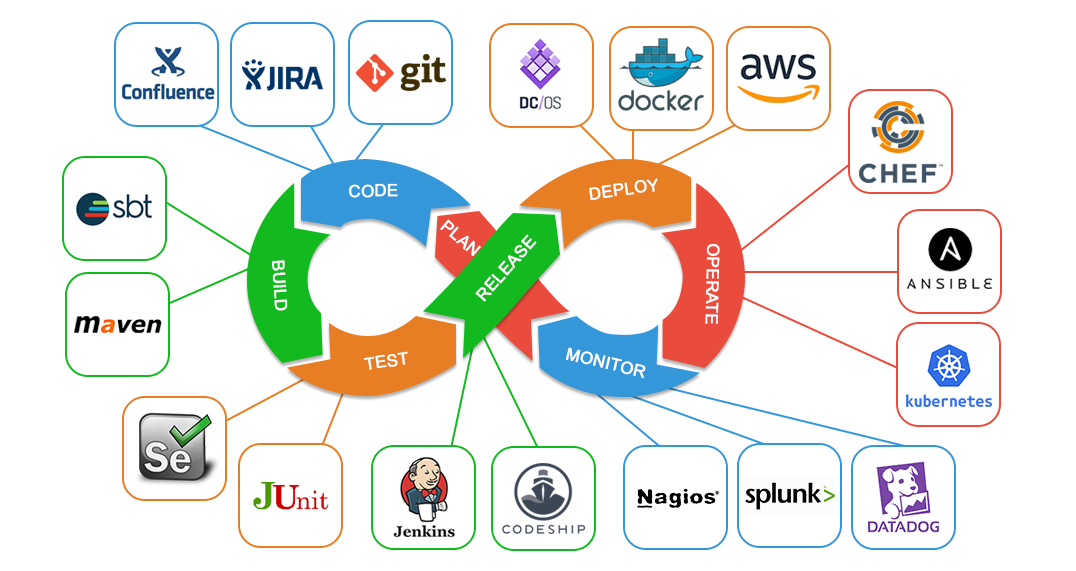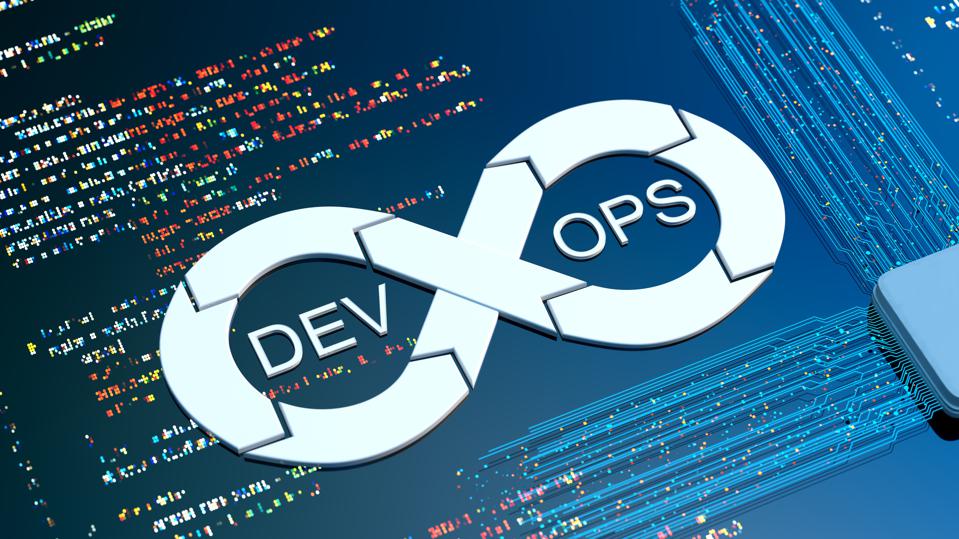Introduction
The term “DevOps” was coined as recently as 2009 by Patrick Dubois. It has become the exciting catchword in the tech industry these days. Now you must be wondering what this means and why has it become so popular?. DevOps combines two major steps, operations, and development, to provide high-quality software in less time.
DevOps Experts help evolve and improve applications at a much faster pace when compared to organizations that use traditional software development and infrastructure management processes. Numerous multinational companies such as Amazon, Google, Netflix, IBM, Cognizant, etc. are looking to hire capable tech enthusiasts who can meet their standards. Today the competition has become tough and the job as a DevOps Engineer is not easy.
Without further ado, let us dive right into some interview questions you may expect as a DevOps Engineer seeking a position.
Top 25 DevOps Interview Questions and Answers in 2023
1. General question about your background and experience.
Answer: You must answer this question thoughtfully. If you have previous experience, you should take care to highlight only the most relevant skills, projects, and achievements. You must also be prepared to answer any follow-up question concisely.
2. How would you explain DevOps to someone without a technical background?
Answer: In simple words, DevOps is the combination of the operational, development, and testing teams in process of software development. The amalgamation of the teams will ensure that the production value is high and accurate. It is not a process or technology or a standard, rather a culture or a methodology that can be followed. It is used as an umbrella term for the culture, processes, and mindset used to shorten the software development life cycle. It uses fast feedback loops to deliver features, fixes issues that crop up, and updates more frequently.
3. According to you what is the DevOps culture and why is it important?
Answer: At its core, DevOps culture incorporates increased communication, transparency, and collaboration between the development and operation teams for the products that they create and maintain. It emphasizes continuous learning and improvement by maintaining team autonomy. It entails four aspects and they are:
- Shared responsibilities: When the two teams understand and share the challenges and responsibilities of getting a product out into the market, they are able to work more efficiently. The developers will be able to simplify deployment and maintenance, and the operations team will be able to define operational needs and automation tools better.
- Autonomous teams: The authority to make quick decisions and make changes is an integral aspect of DevOps. This requires a certain level of trust from the top management and reliability from the team. A lengthy approval process will hinder the speed of the teams.
- Feedback: In a work environment where the development and operations teams work separately, the feedback would be slow and thus the products reach the market slower. Whereas, in the DevOps culture feedback and the subsequent changes will occur much faster as the teams are combined.
- Automation: By automating and integrating the two teams, they will be able to build, test, and release software faster and more reliably.
Thus, DevOps helps the company streamline its resources, process, and tools to become more customer-focused.
4. Why has DevOps become so popular these days?
Answer: In today’s fast-paced life, the market is flooded with new products daily. It gives the customer a myriad of options to choose from. So if an application wants to retain its customers and have them come back to the app regularly, it needs to fix any issues and create updates constantly. This keeps the customers satisfied and interested.
To achieve these speedy updates and changes, DevOps emerged as a winner as it effectively
- Detects defects early and corrects them faster
- Has quicker deployment of Softwares
- Has speedy recovery time in case of release failure
- Increased communication and collaboration between teams
5. What is the role of a DevOps Expert?
Answer: A DevOps expert is expected to be knowledgeable of every aspect of creating the software or application, from its inception to its handover to the customer. Hence, he must be able to fulfill all the roles that are present in the operational chain if it is demanded of him. He is expected to be the jack of all trades.

6. What are some of the skills you consider essential for a DevOps Engineer?
Answer: Here you should mention all the skills you possess like proficiency in Linux Fundamentals and scripting, your understanding of the concept of infrastructure as code, and cloud experience, and DevOps key concepts. You should also express your knowledge of the wide variety of DevOps tools like GATE, Jenkins, Docker, and other technologies. Continuous integration and delivery is an integral skill for DevOps engineers as well. Lastly, communication and working well in teams are no less important to a DevOps engineer.
7. What are the advantages of DevOps?
Answer: DevOps is about the unification of all the processes within creating a Software or application. It facilitates greater collaboration by eliminating steps in a traditional operational workflow. According to a survey conducted by Puppet Labs, in increases:
- Stability
- Security
- App Deployment Speed
This way the efficiency of production is accelerated, the focus is streamlined towards the customer, producing better results faster.
8. Mention some challenges of DevOps
Answer: Firstly, DevOps is a relatively new concept. All the individuals in the company from top management to the grassroots must be able to embrace this change. Only then can it reach maximum potential.
Secondly, the autonomy of the teams is a major aspect of DevOps. The high level of trust the top management is required to place on the teams is not easy. It is also hard for the teams to shoulder and live up to that expectation and responsibility.
Finally, every individual on the team has to be highly skilled and knowledgeable. It is hard to put together such a team that is also able to collaborate.
9. Explain the different stages in DevOps
Answer: Stage 1: Create a plan of action to tackle any improvements and changes that are necessary after a thorough assessment of the current application.
Stage 2: Device a Proof of Concept for the team to understand the real complexities involved. With the approval of the PoC, the project can begin.
Stage 3: Once the project is ready to be implemented, DevOps can be followed by using the phases.
10. What is CAMS in DevOps?
Answer: CAMS or Culture, Automation, Measurement, and Sharing are the core deeds of DevOps.
11. What are the Phases in DevOps?
Answer: The different phases in DevOps are:
- Plan: A well-planned project has a higher likelihood of smoother success. A comprehensive plan with detailed input will give the teams clarity on what is to be done.
- Develop: This phase involves several steps including coding, building, automation, and testing of the software.
- Integration: It involves integrating multiple codes into one and checking for any errors.
- Deployment: Here tools and scripts are used in the automation process. Cloud services are used to store the software so that any further changes made will not immediately affect the functioning of software used by the customers.
- Operation: This process continues throughout the lifecycle of the software. The team maintains and upgrades the software as and when needed.
- Monitor: This permanent phase is used to monitor and analyze the information received to assess the status of the application.

12. Mention some important KIPs involved in DevOps.
- Change of volume requests
- Automated test case pass percentage
- Failure/ error rates
- Failed deployments
13. What is Continuous Integration(CI)?
Answer: In modern companies, multiple developers work on different features of a single software simultaneously. When the different codes are merged into one application, it can lead to conflicts. Continuous Integration is software that helps the programmers upload their codes into the shared main repository often. Once the changes are integrated, CI servers run a test to ensure the application smoothly. If any glitches are detected by CI, the teams are immediately informed.
14. Why is CI necessary?
Answer: CI allows developers to detect and fix errors in the initial stages of software development. By integrating testing and developing together at this stage, the quality of the software has improved and the time taken to deliver the features has also reduced exponentially.
15. What are some differences between Continuous Integration, Continuous Delivery and Continuous Deployment?
Answer: CI or Continuous Integration is the process whereby developers merge their codes into the main repository and automated testing is run by the server to ensure the application can run without conflict with the other branches that are developed by other developers.
CD can be Continuous Delivery or Continuous Deployment, concepts that are related and used interchangeably. They are used separately to indicate the amount of automation happening.
The main difference between Continuous Delivery and Continuous Deployment is that Continuous Delivery requires the approval of the manager for deployment to a production environment. Continuous Deployment on the other hand is automated and does not require manual approval.

16. Mention some CI/CD tools.
Answer: CI/CD tools help the teams to automate their development, deployment, and testing. Some tools can only be used for specific tasks. Jenkins is one of the best-known open source tools for CI/CD. Tekton Pipelines, Spinnaker, GoCD, Screwdriver, and Concourse are some other tools that could be used.
17. What is the role of AWS in DevOps?
Answer: Amazon Web Services or AWS is a renowned cloud provider. Arguably the largest cloud service provider, AWS provides all the features and services of an in-house data center. It simplifies managing infrastructure and provides the teams with the means to implement CI/CD efficiently.
AWS allows its user to automate tasks and processes, giving the user more time for innovation. Its services are flexible and ready to use and do not require installation or software setup. It can be scaled up or down based on the team requirement.
18. What is Configuration Management and why is it important?
Answer: Configuration Management or CM is a systematic way of managing the changes made to the software in a way that does not lose its integrity over time. It uses certain policies, procedures, and tools to evaluate the changes.
Configuration Management provides direction to the design and development team. It gives consistency and improves the product by providing design streamline, documentation, control, and change implementation during various stages of the project. The issues that cropped up would
19. Explain Infrastructure as Code.
Answer: Infrastructure as Code or IaC is a practice of writing a template file that is machine consumable and human-readable and thus helps to manage AWS cloud resources. It is commonly known as programmable infrastructure as it views infrastructure as code.
IaC was created to eliminate the problems with the traditional infrastructure which required people dedicated solely to set up physical infrastructures. This manual configuration was also causing inconsistencies and human error. Another major issue was that of decreased scalability. All these issues were solved with IaC.
20. What is an ALIAS in Linux?
Answer: An alias in Linux is something that shows you the shortcuts in that system. These are defined in the ETC-RC file.
21. What does the CHMOD command do?
Answer: It allows you to change the permission of a file in Linux. It can be changed from read, write, and executable mode
22. Explain the difference between Agile Methodology and DevOps.
Answer: DevOps is a culture that brings together the operation and development teams for the successful production of software or application. It involves collaborative work within the teams as a single unit and thereby improves accuracy and speed of product delivery. It removes the gap between operation and development teams.
On the other hand, agile is a software development methodology that concentrates on iterative, incremental, small, and rapid releases of software, along with customer feedback. It reduces the gap between the developers and the customers.
23. What is SSH?
Answer: SSH or Secure Shell is administrative protocol. It allows users to have access and control the remote servers over the Internet. It is a more secure and encrypted version of its predecessor known as Telnet.
24.What is a ZOMBIE PROCESS?
Answer: The ZOMBIE PROCESS is a process that is in a terminated state but has not yet released the resources.
25. What is a Blue/Green deployment pattern?
Answer: A blue/green deployment pattern is an application model that continuous deployment that gradually transfers user traffic from a previous version of an application or software to a newer almost identical version.
The older version would be called the blue version and the new version green. Once the traffic is fully transferred the older version is kept on hold in case of rollback necessity.
Is a Certification Course Beneficial?
There are several supplementary courses you can take to brush up on DevOps. A course that is geared to make The course offered by Henry Harvin Agile and Scrum Academy is well reputed and makes you proficient in all aspects of DevOps Engineering.
Henry Harvin Agile and Scrum Academy

About DevOps Certification Training Course
The DevOps Certification Training Course offered by Henry Harvin on DevOps will help you gain proficiency in all aspects of DevOps Engineering. It will hone your knowledge of DevOps methodology and its latest tools.
The 9-in-1 course has a well-organized syllabus that is designed by industry experts to ready you for the job market. It will prepare you to be competent and adept in the increasingly competitive industry.
The course is designed for candidates aspiring to the post of cloud engineer, solutions architect, systems administrator, technical leads, software engineer, and DevOps engineer. This course can also be availed by freshers looking for practical training with live projects.
The curriculum is tailored to ensure that you gain a thorough understanding of Software Development, Software Development Life Cycle, DevOps Tools, and more. Concepts of Continuous Deployment, skills of Configuration Management using Puppet Ansible and Kubernetes, Software Version Control using Git, and other essential skills are also covered in the curriculum. Thus candidates can become a DevOps experts with this course.
Benefits
- Gold Membership for 1 year of the Henry Harvin Agile and Scrum Academy will offer you E-Learning Access with training videos and other materials.
- Free Bootcamp Sessions for the year.
- 40 hours of live online interactive sessions
- Training will include Live Projects that will give the students a taste of the industry and the field of DevOps Methodologies and Configuration Management.
- Internship assistance will be offered to every student.
- Certification is recognized by the Government of India and trusted by numerous leading companies in the industry.
- Henry Harvin offers a 100% Placement Guarantee prop up for 1-year post successful completion of the course.
- Free entry to #AskHenry Hackathons and other competitions
Fees and Duration
- Self-paced Course offers lifetime support and access at ₹13500/-
- Live Online Classroom is preferred as it offers everything in a Self-paced Course along with live interaction with industry experts to clear doubts, unlimited live sessions, and recordings of all batches. The fee for the course is ₹15000/-
Tips for the Interview
- Attire
Many studies have concluded that first impressions are a key factor in a job interview. So it is essential that you dress professionally and formally. Remember to avoid bright, garish colors.
- Body Language
The ideal body language in an interview is confident and respectful. Maintaining eye contact with the interviewer will showcase your trustworthiness and intelligence, and also will help you build a rapport. Employers consider professional mannerism an integral aspect of employability.
- Research into the company and management
Read up about the company, its management, policies, mottos, and work culture as much as possible before the interview. This will help you not to commit any faux pas during the interview process.
- Cordial and polite
Pretty manners as we casually call it can come in very handy during an interview. The minute you arrive at the venue leave behind your casual self. All interactions you have from the receptionist to your fellow candidates should be cordial, polite, and formal. You must also refrain from rambling personal information.
- Proactive
Be proactive in asking questions regarding your duties in the company and any other queries you may have. Express your interest in the company policies and office culture. This will help you stand out from the other candidates. A word of caution, make sure your questions are well thought out and based on the thorough research you have done.
Conclusion
A little over a decade after the term was coined, it is clear that DevOps is here to stay. However, it is not easy. These interview questions are the most popularly asked ones. Be prepared to answer more questions in depth based on the position you are applying for. This requires candidates to be a jack of all trades and know a little about every step in the cycle of software development. Hence, the competition in the job market can be high.
Attending an interview can be a nerve-wracking process. Being a DevOps expert is a small part of cracking the interview. Maintain your calm and answer the questions to the point without digressing. Your attitude and professionalism in an interview matters as much as your knowledge and skillset.
Remember that you are eligible for the position hence why you gained an interview in the first place. So, communicate your thoughts and ideas as precisely as possible. Most importantly, believe in yourself and be confident in your capabilities.
I wish you all the very best to crack the interview!
DevOps is a culture that combines development, testing, and operations teams in a software development process.
Yes, DevOps is a very promising and rewarding career as long as you have the necessary knowledge and skill set. It is one of the most in-demand jobs and shows little signs of slowing down.
A bachelor’s in computer science or related disciplines will help you in DevOps. Besides that, DevOps requires a variety of skill sets such as devOps tools like Linux, docker, scripting languages, experience in CI/CD pipelines, and more. A certification course in DevOps will help you get to your goal faster.
The key difference between DevOps and a developer is in the specifics. A developer specializes in a single coding language and platform. DevOps on the other hand is more widespread. DevOps is involved in every step of the project.
Being a DevOps engineer is not necessarily for a fresher. It requires expertise and experience in several aspects of software development. However, it is doable as long as you gain enough knowledge.
Understand and educate yourself on DevOps principles, culture, the reasons why it came into existence, and its challenges. After that go about mastering the DevOps tools and getting certified.






The author has done an excellent job of explaining the questions and answers in a simple and concise manner. The information is easy to understand and the examples used are practical and relevant. thank you provide this content for helping us.
This article is a great resource for those who are new to DevOps as well as experienced professionals looking to brush up their knowledge. The questions and answers cover both basic and advanced topics, making it a valuable tool for anyone in the field.
The Top 25 DevOps Interview Questions and Answers in 2023 is a great resource for anyone preparing for a DevOps interview. The author has done an excellent job of covering all the key topics and the information provided is both accurate and relevant.